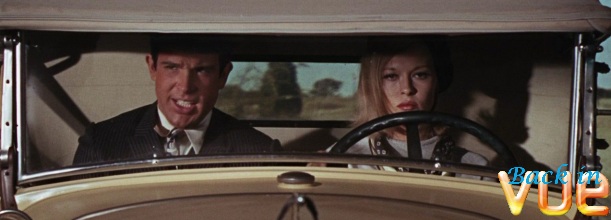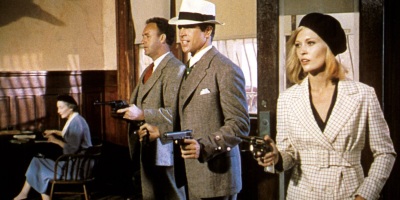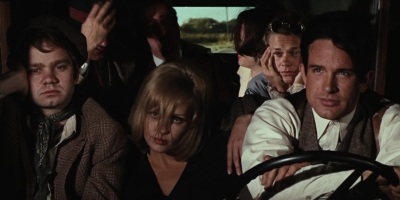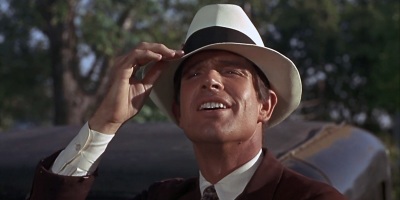Back in Vue #3 – Bonnie & Clyde

For the life of me, I can’t even begin to explain how or why I’ve spent x amount of years (unintentionally) side-stepping the Bonnie and Clyde buzz. I remember hearing my parents talk about them as if they were a distant aunt and uncle. Gradually decades past and Bonnie and Clyde became one of those films that I could never watch because something always got in the way, or I just forgot about it. Then Vue heard my prayers, and decided to play Bonnie and Clyde as part of their promise to bring cult classics back to the silver screen. It was finally my time.
Firstly, I was the only one in the cinema. I took this as a sign from the Film Gods. Free to put my feet up and slurp my drink undisturbed. The opening was like a set-up for a Tom Waits song; all small town boredom in the dusty American suburbs, a pretty waitress with a taste for danger taken away by a charismatic, bold ex-convict with a gun on his belt. Already, this was my scene. By the end, I was in love with these criminals. It had begun by enticing me in with a lonely, half-naked Faye Dunaway attempting to seduce a playful Clyde (Warren Beatty), surreptitiously winding in a story about friendship, rather than just love. There may have been no strict plot to follow, but the film doesn’t meander; the whole thing is just a gradual character unravelling in beautiful, poignant, sometimes very bloody, photographic scenes.
In true Hollywood style, Bonnie and Clyde is loosely based on the story of Bonnie Parker and Clyde Barrow. Robbing banks, gas stations, grocery stores – but never stealing from the poor – the two leave behind bloodshed and pissed off shop workers all across America, recruiting the infamous ‘Barrow’ gang along the way. Never before had two criminals, two anti-heros, become so sympathetic with an audience. Bonnie and Clyde plays with the rules for a bit, like a cat teasing a ball of yarn, and then discards them, leaving behind glamorised sex and glorified violence that had never been seen so vividly on screen before.

How do you even begin to review a cult classic like Bonnie and Clyde, so deeply embedded in pop and folk culture, to its deserving credibility without ever having experienced it first-hand in the heart of the sixties? Even forty years after its release, the film is still as impressive as if it been released just yesterday. I was quite willing to not like the film. But the film’s insistence that Bonnie and Clyde were actually two very real, imperfect characters was dazzling. You can see its influence in modern day cinema as well, from Tarantino to Thelma and Louise and essentially all films involving guns, road trips and a bygone era – that one we’re all nostalgic for even though we’re seventy years too young.
But it’s not always pulled off as well as it is in Bonnie and Clyde. You can see a twinkling of the trouble-making lovers at the beginning of Pulp Fiction in Pumpkin and Honey Bunny, but even then they don’t have that insufferable melancholic fate hanging over their shoulders, because we don’t get to know them as much as we do Bonnie and Clyde. We don’t see them cry about their mother or lose their brother. The moment the Barrow gang start to fall apart and you know it edges closer to an inevitably violent end, it’s heart-wrenching. You don’t want the story to end – you just want it to keep going, down a road to nowhere in stolen cars.

And precisely echoing this ‘road to nowhere’ style is Arthur Penn and his direction; again, such forward-thinking and unfettered camera shots are mind-blowing to the modern eye.
To think about the artistic license Penn used and got away with back then is ridiculous. Like when Clyde shoots a man’s face through the window of a car just to get rid of him, or Buck Barrow’s insufferable, jerky death mixes with Blanche’s screams. The violence may be covered in glitter, but it’s never gratuitous. Most films of that era only flirted with violence, skirting around capturing it so obviously. And the sex – Christ, the sex – imagine the reaction when Penn had the guts to portray Clyde as impotent? But Penn clearly knows what he’s doing, making the sexual climax at the end like a heaving sigh of relief for the entire audience.
But in comes that ending, and you’re back where you started; completely fucking distraught and wanting to punch everything around you. From the minute C. W. Moss’ dad asks C.W. to hide in the store so the police can get to Bonnie and Clyde, your breathing stops. The last twenty minutes or so are so full of unbearable tension, but the ending is still shocking. It’s one of the best, if not the best, endings in film history. Loud, then deadly silent. What is about films like Bonnie and Clyde; films about runaways and tearaways and outsiders? Has it all just become romanticised now? Would I still feel like this if I watched a 2013 film about a couple of idiotic tearaways raiding petrol stations up and down the M3? Probably not.

All I know is, there’s more to Bonnie and Clyde than meets the eye, and that’s what makes the film such a spectacular watch. As much as Penn played around and took full liberty on the characters, even if the real Bonnie and Clyde were nothing like Beatty and Dunaway’s characters, there’s still the reality that these kids got caught in a whirlwind of media and trouble, and they loved it. It’s so honest of them, if you think about it; you can’t help but stay on their side. And they got their wish in the end. When Bonnie reads out her poem about the two of them, and Clyde turns to her and beams, saying “You’ve just written my story,” – you know, and they know, that their story will always be remembered.





Recent Comments